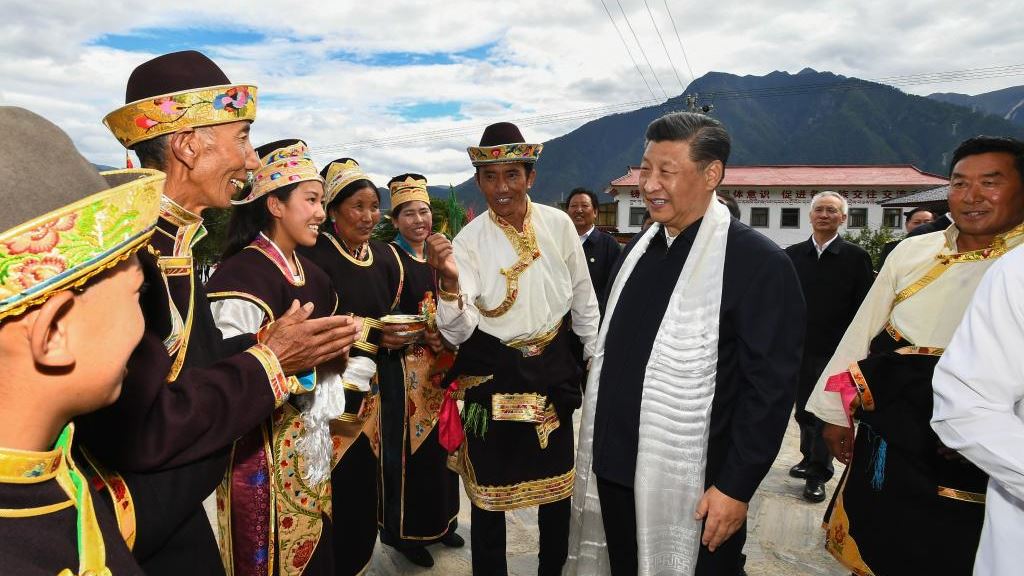Xi hails Tibets 7 decades of progress

President Xi Jinping has stressed the importance of stability, development, ecological conservation and border security in the Tibet autonomous regions sustainable growth, urging efforts to promote ethnic unity and progress for lasting peace and stability and high-quality development in the plateau region in the new era.
Xi, who is also general secretary of the Communist Party of China Central Committee and chairman of the Central Military Commission, made the remark during an inspection tour of Tibet from Wednesday to Friday. The inspection tour took him to the cities of Nyingchi and Lhasa, the region's capital.
His visit came on the occasion of the 70th anniversary of Tibet's peaceful liberation, and was the first time a top Chinese leader has taken part in such a celebration in the history of the Party and the country. Observers said that Xi's visit to Tibet fully demonstrates the strong support of the CPC Central Committee for Tibet as well as its care for the people of the plateau region.
During the visit, Xi said that over the past seven decades, Tibet has realized all-around socioeconomic development with people's livelihoods greatly improved, and both urban and rural areas having taken on a new look.
Practice has proved that the guidelines and policies for work related to Tibet are totally correct, Xi said, urging efforts to fully implement the Party's strategy for governing Tibet in the new era, which stresses implementing the new development philosophy, serving and integrating into the nation's new development paradigm, advancing high-quality growth and strengthening border security.
During his visit to Nyingchi on Wednesday, Xi visited the Nyang River Bridge to inspect ecological conservation in the basin of the Yarlung Zangbo River, and its tributary the Nyang River. He then visited a local urban planning hall, a village and a park in the city, inspecting the local development planning, rural vitalization and park construction efforts.
On Thursday, Xi went to Nyingchi Railway Station to learn about the overall design of the Sichuan-Tibet Railway and the operation of its Lhasa-Nyingchi section, and then took a train to Lhasa.
Officially put into operation last month, the Lhasa-Nyingchi section is Tibet's first electric railway. Xi also inspected construction along the railway during the journey.
Xi has attached great importance to the building of the railway project and made several instructions about its construction work. He said that building the Sichuan-Tibet Railway is a significant step to promote Tibet's development and improve local people's livelihoods.
Given the complex topography and climate conditions and great difficulties in construction of the section between Ya'an in Sichuan province and Nyingchi, Xi stressed the need to allow technological innovation to play a key role in the process and to stick to scientific, safe and green construction of the landmark railway.
During his visit to Lhasa on Thursday, Xi visited the Drepung Monastery, Barkhor Street and the Potala Palace square to learn about work on ethnic and religious affairs, the conservation of the ancient city, and the inheritance and protection of Tibetan culture. Xi was warmly welcomed by local residents from various ethnic groups and he chatted with them.
He stressed the need to fully implement the Party's guidelines for religious work in Tibet, respect local people's religious beliefs, manage religious affairs in accordance with the law, and actively guide Tibetan Buddhism to adapt to socialist society in order to promote religious, social and ethnic harmony and allow religion to play a positive role in advancing social development.
Speaking at a meeting in Lhasa on Friday attended by officials of the autonomous region, Xi urged the region's authorities to uphold the people-centered philosophy and earnestly improve social governance to ensure national security, social stability and people's happiness.
Efforts should be made to strengthen exchanges and integration among various ethnic groups to improve people's awareness of the motherland, the Chinese nation, Chinese culture, the Party and socialism with Chinese characteristics, and lay a solid ideological foundation for ethnic unity, he said.
Xi called on Tibet to deepen reform and opening-up, step up building major railway and highway infrastructure facilities, develop specialty industries and coordinate development and security to blaze a high-quality development path suited to local conditions.
He underlined the need to consolidate and expand the results of poverty elimination to enable this to be integrated with rural vitalization efforts. Efforts should be focused on issues concerning people's livelihoods, such as employment, education, social security, healthcare, eldercare and housing, in order to further enhance people's sense of gain, happiness and security, he added.
While highlighting the importance of ecological conservation in the plateau region, Xi urged the local authorities to stay focused on improving environmental governance, strive to protect the biodiversity of the Qinghai-Tibet Plateau, and stick to the ecology-first and green development path to ensure modernization featuring harmony between man and nature.
Xi also met on Friday with representatives of military officials and soldiers stationed in Tibet, and urged them to make contributions to promoting Tibet's long-lasting peace, stability and prosperity.
